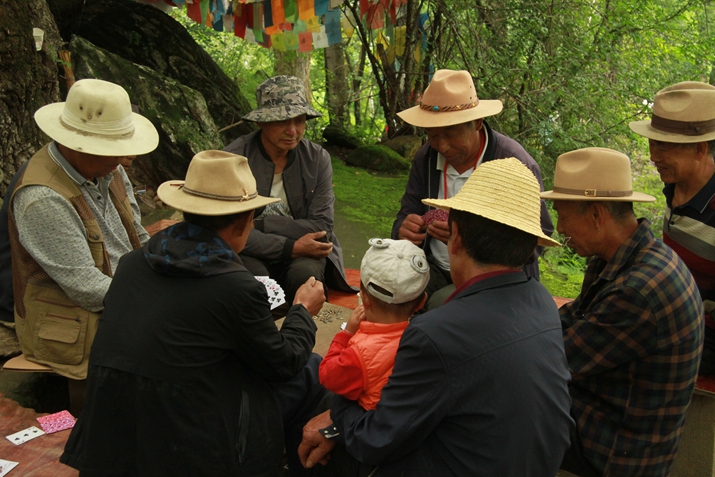| Voice |
| Cultural conservation meets Douyin | |
|
|
 The local cards are stacked in Douyin's favor (KATE KOLOGRIVAYA)
We arrived very late to the city shimmering with neon lights. The road was narrow, long and winding, but the driver knew it like the back of his hand. We entered huge gates decorated with flags and the guesthouse owner decked out in traditional attire welcomed us by serving up a late night dinner. Tasty. The place we arrived at was Danba, or Rongzhag, a county of the Garze Tibetan Autonomous Prefecture in Sichuan Province. Zhonglu is one of the area's oldest and best preserved villages. In Tibetan, the name means "the promised land." In the past decade, the region's residents have switched from growing corn, peppers and raising pigs to the tourism industry. The government has been actively supporting those endeavors as youngsters constantly leave the place in pursuit of more promising urban opportunities. Dawa, our local guide, explained, "They don't feel connected to the local culture. No one is interested in traditional clothes and customs anymore; they're deemed outdated and won't bring teenagers any economic benefits." Dawa works at the Yunhe Center. This social enterprise launched in 2015 in support of nature-based learning and community development. The team currently consists of several people focusing on sustainable tourism and elderly care projects. We arrived at Yunhe in the early morning, when the center's director said they would be having some visitors over. "Some" turned out to be a group of 46 from Xiaojin Village, locally famous for its apples and valley views. All were decked out in traditional clothing, different from that of the people in Zhonglu. As soon as the official part of the center's introduction was done with, women whipped out their phones and… started filming. "I'm very popular on Douyin [China's TikTok]," said one lady. "What do you do on there?" we asked. "I show my local culture and dancing. People really like it; I get thousands of views every time I publish something. Find me on Douyin," the lady replied. The next day we were interviewing a local woman who introduced traditional songs to us for a documentary about the preservation of local culture. "The old singing is dying because the dancing is much more popular among the youth." "We've danced before, with your neighbor," said a cameraman. "Oh, I know! I saw her posting about it!" "Why didn't you join in?" "Why should I? I can watch you dance from the comfort of my own home!" "Do you go dancing at the temple, by any chance? It's a 20-minute walk from here," I asked out of curiosity. "I don't go there; it's too far, another village basically. But I know what they're doing, I've seen their modern remixes of the traditional dances…I follow them on Douyin." That evening, my head was on fire: "How to preserve culture? What will make people care; what story to tell?" I sat on a sofa with the elders of the guesthouse family. We didn't know how to talk to each other because our standard Chinese was very limited. Every time we would try to explain something to each other we would just end up laughing. Suddenly, the grandpa turned his phone to me and said. "Look!" I watched a video of a beautiful dancing troupe. Men were wearing long-sleeved woolen tunics, while women had on various hats and dresses. The colors were so different, so magical. They melodically sang along to the music, they were moving to the tempo, jumping to the rhythm. It looked incredible. "It's on my Douyin," said the old man, "Subscribe!" The author works for an environmental education social enterprise and lives in Shanghai Copyedited by Elsbeth van Paridon Comments to dingying@bjreview.com |
|
||||||||||||||||||||||||||||
|